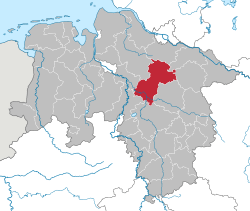Heidekreis
| Heidekreis | ||
|---|---|---|
| District | ||
| ||
 | ||
| Country |
| |
| State | Lower Saxony | |
| Capital | Bad Fallingbostel | |
| Government | ||
| • District admin. | Manfred Ostermann | |
| Area | ||
| • Total | 1,873.5 km2 (723.4 sq mi) | |
| Population (31 December 2015)[1] | ||
| • Total | 140,264 | |
| • Density | 75/km2 (190/sq mi) | |
| Time zone | CET (UTC+1) | |
| • Summer (DST) | CEST (UTC+2) | |
| Vehicle registration | HK (until 31.7.2011: SFA) | |
| Website | soltau-fallingbostel.de | |
Heidekreis ("Heath district") is a district (Landkreis) in Lower Saxony, Germany. It is bounded by (from the north and clockwise) the districts of Harburg, Lüneburg, Uelzen, Celle, Hanover, Nienburg, Verden and Rotenburg.
History
Historically the region belonged to the Duchy of Brunswick-Lüneburg and its successor states. The district was established in 1977 by merging the former districts of Soltau and Fallingbostel as Soltau-Fallingbostel (German pronunciation: [ˈzɔltaʊ falɪŋˈbɔstəl]). On 1 August 2011 it was renamed to Heidekreis.
Geography
The district includes the western half of the Lüneburg Heath (Lüneburger Heide). Since this landscape is so characteristic for the district, it calls itself "the Heath District". The capital is Bad Fallingbostel, although it has only 11,800 inhabitants and is only the fifth largest town in the district.
Coat of arms
The coat of arms displays:
- in the upper half the heraldic lion of the Duchy of Brunswick-Lüneburg
- in the lower half a megalithic grave
Towns and municipalities

| Towns | Samtgemeinden | |
|---|---|---|
|
|
|
|
| 1seat of the Samtgemeinde; 2town | ||
Culture and places of interest
Cultural matters are looked after by those charged with communal cultural support within the towns and municipalities, the parishes, the banks, the Lüneburg Regional Association and private cultural initiatives.
Museums and collections
- Dat ole Hus (heath and open-air museum in Wilsede)
- German Tank Museum in Munster (German military history of the 20th century)
- Düshorn Village Museum (life and work around 100 years ago)
- Hof der Heidmark in Bad Fallingbostel (memorial to the Heidmark)
- Klingendes Museum (mechanical musical instruments) in Schwarmstedt
- Museum of the Archaeological Working Group in Bad Fallingbostel
- Soltau Museum (local history and archaeological exhibition) in Soltau
- Soltau Toy Museum (toys from four centuries)
- Peetshof (Zeugen Wietzendorfs um 1900) in Wietzendorf
- Prussian History (Pavillon im Landschaftspark Iserhatsche) in Bispingen
- Pult- und Federkielmuseum (Schulmuseum in Insel) in Schneverdingen
- Rischmannshof Heath Museum (heath and open-air museum) in Walsrode
- Schäferhof Neuenkirchen (Moorland sheep rearing to preserve the heath and moorlands between Neuenkirchen and Soltau) in Neuenkirchen
- Heimathaus auf dem Schroershof (historic farmstead with many buildings) in Neuenkirchen
- Art Society and Springhornhof Foundation in Neuenkirchen
- Bothmer School Museum (schools in the times of the Emperor) in Schwarmstedt
- Ehrhorn Woodland Museum (woods – heathland – people) in Schneverdingen
Cinemas
- Munster: Deutsches Haus
- Soltau: Gloria-Kino-Center
- Walsrode: Capitol-Theater
Lüneburg Regional Association
The county is a member of the Lüneburg Regional Association (Lüneburgischer Landschaftsverband), which looks after regional, cultural-political tasks.
Nature reserves
There are es 26 nature reserves in the county of Soltau-Fallingbostel.[2][3] The largest one (Lüneburg Heath Nature Reserve) has an area of 13,222 ha in the territory of the county of Soltau-Fallingbostel, the smallest (Söhlbruch) has an area of 8 ha.[4]
Jewish cemeteries
There are four Jewish cemeteries in Soltau-Fallingbostel : in Ahlden, Rethem, Soltau und Walsrode.[5] There are protected cultural monuments – stone witnesses to former Jewish communities and a thriving Jewish parish live into the 1930s. The cemeteries are mainly on the edge of parishes.
See also
References
- ↑ Landesbetrieb für Statistik und Kommunikationstechnologie Niedersachsen, 102 Bevölkerung - Basis Zensus 2011, Stand 31. Dezember 2015 (Tabelle K1020014)
- ↑ Landkreis Soltau-Fallingbostel beim NLWKN
- ↑ Neue Naturschutzgebiete ab 2009 beim NLWKN
- ↑ Naturschutzgebiet "Söhlbruch", Kennzeichen: NSG LÜ 045
- ↑ LANDKREIS SOLTAU-FALLINGBOSTEL. In: Jüdische Friedhöfe nach der heutigen Verwaltungsgliederung – Niedersachsen. In: Übersicht über alle Projekte zur Dokumentation jüdischer Grabinschriften auf dem Gebiet der Bundesrepublik Deutschland
External links
![]() Media related to Landkreis Soltau-Fallingbostel at Wikimedia Commons
Media related to Landkreis Soltau-Fallingbostel at Wikimedia Commons
- Official website (German)
Coordinates: 52°55′N 9°45′E / 52.92°N 9.75°E
